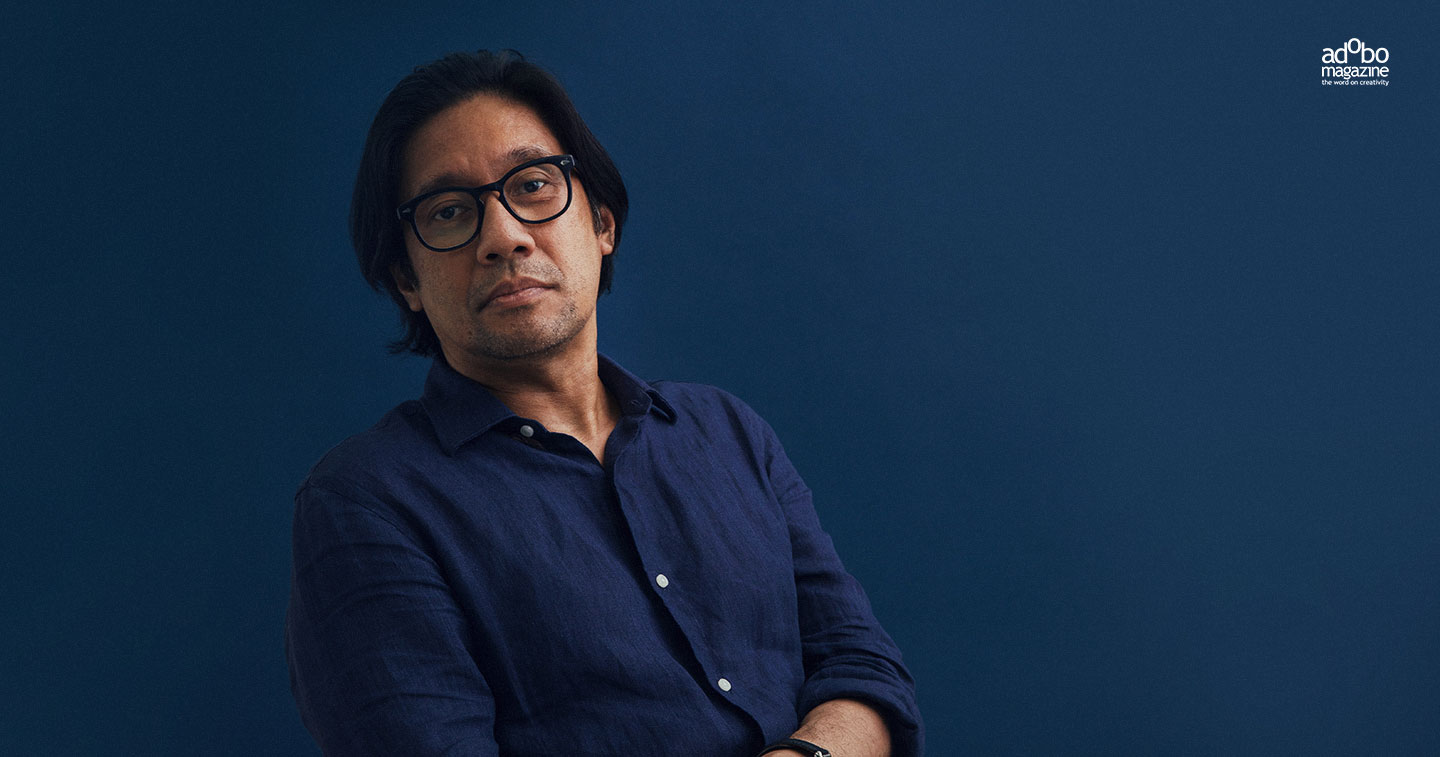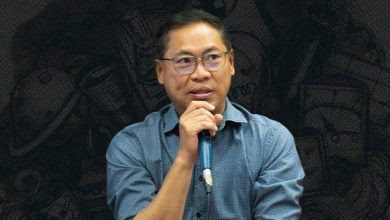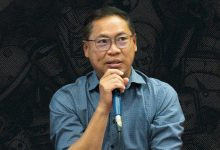MANILA, PHILIPPINES — An exploration of what it means to remember an absent father; one who reaches out decades after he leaves for a life in the US with his lover. A story of how a late-night Facebook message turns into a virtual quasi-love affair with a childhood sweetheart across the world. A series of glimpses into childhood moments that turn out to be fundamental in answering — and posing — questions of identity, love, loss, and everything in between. Joy: A Novel by Angelo “Sarge” Lacuesta is all these and more.
And while that may sound like too many things at once, Lacuesta’s compelling storytelling and careful curation of the moments in the life of the protagonist Lucas Letrero doesn’t just make the narrative work. It also makes it clear that this is the only way one’s life story can be told. Not with clear beginnings, middles, and ends but through a reflection weaving through key moments and forming paths of connections from one memory to another. Paths that are not necessarily linear or obvious but meaningful nonetheless.
Joy may be Lacuesta’s first novel, but even those unaware of the author’s award-winning short story collections can tell that he is no stranger to crafting immersive narratives the way they’re meant to be told.
 In an exclusive interview, adobo Magazine sits down with Lacuesta as he expounds on what writing and publishing his debut novel was like, how he tackled telling a story that spans decades, and how the fleeting and impressionistic way the novel touches the many threads present in it is a reflection of how life is and should be experienced.
In an exclusive interview, adobo Magazine sits down with Lacuesta as he expounds on what writing and publishing his debut novel was like, how he tackled telling a story that spans decades, and how the fleeting and impressionistic way the novel touches the many threads present in it is a reflection of how life is and should be experienced.
Your career has been full of award-winning short story collections, nonfiction, and you even wrote a collection of graphic stories, but this is the first novel that you’ve published. Have you always wanted to publish a novel? Has this been in the works for a long time now?
That’s a good question because I never saw short stories as — like a lot of people say — “short stories are short pants and novels are long pants.” I never saw short stories as a sort of younger brother to the novel. It’s completely different for me; it’s a completely different form of writing. So, I have a lot of respect for it. And I have a lot of love for it. So, I’ve always loved doing short stories, but for the novel, maybe I just wanted to try something different.
Just like with the book of graphic stories, I wanted to find out if I could tell a story in a different way with a novel. And I guess it turned out that I could tell it a different way. I wasn’t really pressuring myself to write a novel all these years because I always loved the short story and I’ve always thought it was a very Filipino genre.
Actually, the writing world wants novels rather than short stories. And that’s understandable. It’s like how the world wants feature-length films rather than short films. So, I think [working on the novel] was a really decided sort of entry into more international publishing. At the same time, I felt that maybe I had a story that demanded a kind of novel form.
So, you arrived at the premise or the concept before you decided that it was going to be a novel?
Yeah, I had a lot of these sorts of different thoughts. And then there was sort of a moment where I had a unifying thought of “Ah, yeah, this is how it’s going to become a novel.”
Is there a particular reason why you wanted to tell this story? How did you arrive at the premise and the decision that this is what you wanted to write next?
You know, life is not really told in a long story. You don’t really live a life that way where you have a beginning, a middle, and an end. It’s really messy. So I guess this came about from different stories from different people.
One of the stories is about a friend of mine whose dad won a songwriting contest, and the premise was that he would go to the States, all expenses paid. And it turned out that it was the sort of infidelity story that was very common for his times.
As for the main character, he gets into Tinder, gets on the dating app, and basically he fucks a girl, and it becomes a meaningful relationship. I saw how, for people who do that, for people to date, who engage socially this way, it’s also meaningful — it’s equally meaningful, and I should say joyful.
I’m glad that you mentioned how life can be messy — it’s a bunch of different stories — because in the present timeline when Lucas gets the email from his dad and he’s also reconnecting with his childhood sweetheart, that in itself is already such an intriguing premise. But you also chose to add anecdotes from his childhood and his adult life that weren’t obviously connected to the main turning points in that present timeline. The story spans decades and you managed to condense it under 200 pages with these anecdotes.
I think it also goes with age. Because when you’re young and thinking about your life, you think your life is so dense. You realize later on that the real things that matter in your life now can really just amount to just under 200 pages, I suppose. Or even less.
This is the thing with a novel; it demands a certain volume. But I don’t like to see it that way. The story of our lives is what is supposed to demand whatever form, not the other way around. So, I like to think that our lives really are just a bunch of stories. And these stories come together to form, you know, a huge sort of joyful, sad, big story that you don’t need to know the meaning of. These are meaningful events that come together to form a life with some meaning. But ultimately, it’s really just an impressionistic view of things. Length is not really a measure of life.
Did you have a hard time choosing which meaningful parts to include from Lucas’ life?
Actually, I did, because there was so much happening in Lucas’ life. I didn’t know [what to focus on] at the start. Should I focus on his advertising career? Should I focus on his love for his absent father, which is a great trope in fiction and literature? Or should I focus on his long distance, sort of unrequited love affair with his childhood sweetheart?
I realized that he needed to do all of these things in a very impressionistic and sort of fleeting way for each one… which is, I think, the way we enjoy things in life. We don’t really sort of dive into something and get swallowed up by it, otherwise we would never be able to get out.
Yeah, especially since it spans from the 60s to the 2010s. Was there a particular era or section of the book that you enjoyed writing the most or that you were most inspired to do?
This is why I’m happy that adobo chose to interview me about it kasi I really sort of felt at home and I felt a bit empowered, in a way, when I wrote [Lucas’] advertising pitch. I felt really at home doing that because it was exactly the language that people use when they pitch — it’s brand language. It’s real language. It’s not even, you know, hiked up to high fiction, or sort of dumbed down. It’s real advertising language.
I felt very comfortable doing that. And I felt that if you were a reader who was not acquainted with the language, you would immediately understand that this is a world where these things are valued as opposed to other things. This is a world where people look at things through this lens, so I had a lot of fun [writing this part] because it’s like looking back at my own advertising, sort of background or history.
I noticed that there’s a strong sense place in the novel. It feels as fleshed out as the characters and the plot because how you described the settings was very vivid, like the first scene with that Christmas show in Cubao for example. Were the places that you included something that you were particularly inspired by?
I think the sense of place is something that a novel is built for. A novel is a great opportunity to achieve a sense of place. That’s something a short story can’t do or can’t do as much as a novel can. This kind of “I’m going to get an impressionistic view or completely touchable and liveable experience; a view of a place that you couldn’t experience.”
Yeah, I wanted to capture that, but I wasn’t being nostalgic about it. Some people see the novel as a nostalgic novel, and I like that also because obviously they relate to it. That’s great. But for younger people like you, for example, you were never there during the time. I was never there during the 60s; I was born after the 60s. But that’s what the city is about. That’s what the Filipino consciousness is about. If you live in Manila, if you grew up in Manila, or any city like Davao City, which is featured in the novel as well, the city enters you, and it becomes a continuing moment. It’s not a nostalgic moment.
So, if I’m reading it, and I’m as young as you are, you feel a sort of connection to it even if you never saw that Christmas show. But there is a connection to it that is very Filipino and this connection is really rooted in the fact that you grew up in Manila or you know what it’s like to be in Manila. This kind of sense of place that’s really found inside us, not outside, is something that the novel can achieve — not necessarily my novel. I don’t know if it does. I’m not going to presume that it does. But what I like also, and what I’ve discovered is, that some people find it nostalgic. When I was writing it, I was completely not nostalgic about it. It was a living memory in me. It existed in me while I was writing it, so there was no looking back. Because the city, you know, it’s always past, present, and future at the same time.
Yeah, I saw people calling it a nostalgic piece for Gen X, but as someone who’s read it and wasn’t alive during that time, it wasn’t necessarily nostalgic. It’s just that it still kind of pulls you into what Manila was or what Manila stood for at that time.
Well, thank you for giving it a close reading. It really means a lot to me, and I really appreciate it. And the interesting part is that more than half of the novel occurs in the current time. I supposed that the second half of the novel, which is where he has a Tinder date and all these things happen, you know, like the fast food joint opens in his town. These are all very current things. And I wonder also what different generations might read into it. What an older generation person might read into it who might get morally sort of shocked or a little bit uncomfortable. But that’s great. Nostalgia is a sort of comfort, it’s for comfort, but the other half of it isn’t supposed to be comfort.
Yeah, there’s definitely that shift halfway through the book, and you really feel it as a reader. So, since the novel can be nonlinear sometimes, especially because there’s the earlier half set in the past where the memories aren’t necessarily chronological, it’s a very character-driven novel. When you thought of what you wanted to write, did you conceptualize what kind of character you wanted to create first, or did you already have an idea for the plot? Which came first? Or did it come hand-in-hand?
That’s a great question because a lot of people sort of start the writing process with ideas so that it’s a novel of ideas rather than a novel of, let’s say, plots. It’s very difficult to choose; it’s very difficult to breach all these and balance all these things.
I started with a character and that character lived in a city. That character lived a life. That character felt some things, experienced a lot of things. And secondly, the plot just happened. It’s not necessarily a forced plot, it just happens. So, in terms of ideas, this is not a novel of ideas. To me, the Philippine experience in the 70s, 80s, and up to now — it’s not an experience of ideas. He’s a character who experiences joy, experiences pain, etcetera, etcetera, as moments. They’re not ideas to him. He’s not an idea. He’s a character. He’s a person. So that’s what I started with. I’m interested in the person rather than the idea. Although, I understand the power of a novel of ideas, and maybe one day, I’ll get to write one, but this is certainly a novel about a person’s life.
Since this is your first time publishing a novel, was the process for writing it different? Were there any problems you encountered that you didn’t encounter when you were writing your short story collection?
I think the problem with it was I didn’t want to let it go. Every time the publisher sent it to me saying “please have a last look,” this last look would take ages. I think revising it took longer than writing it. Because you sort of have struggled with not only the form, but also [questions like] should it be plotty? Should I put a plot point here? Should they not like this character? Should it be like this? And then you just learn to do two things.
The first thing you learn to do is trust your characters. They’ll do what they want to do. They don’t need a reason to do things. In life, sometimes, we do things without reason, right? Or we do things without motivation. Or we do things just despite ourselves, for fuck’s sake, right? When you let go of the character that way, then you trust the character, then he just goes his own way. The second is that you let go of the things that hold the novel back from being real. From being believable or credible.
So, the first thing is to let go of your character. Just trust your character. The second thing is just let go of the novel itself, you know. you can only go so far. The writer can only go so far — he’s limited himself. And the novel, you just let it go, because people will interpret it different ways anyway. You just have to trust yourself that you put everything you wanted to put there.
So, what are you planning to write next and how has this experience of writing a novel been?
That’s the easiest question, I guess, because I’m already in the middle of writing another book. This book is more personal. It’s super personal and almost handmade. I started as somebody who wrote poems, so my next book is a small chapbook of poems. They’re very personal, and they’re very meaningful. But I already have the next novel in mind, and I’m going to plot that out soon.
It’s fun to write a novel pala! I didn’t realize it. It’s fun because you’re living in this world, and it’s very dreamy, and you can be lutang, you know? And you don’t have to go back to the real world for a long time. Because when you write a short story, when you’re done with it, you’re back in the real world. [With the novel] I have an excuse to stay in this world. Even if I’m in the real world doing business or attending meetings, there is another world to run to, and the novel allows for a huge world to enter and to remain in.








